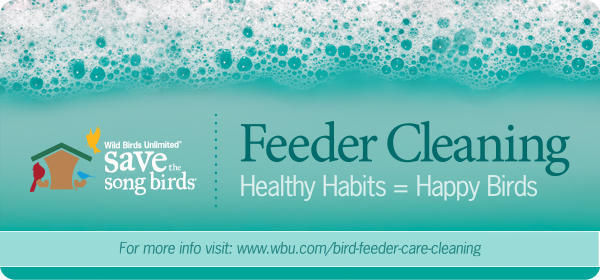
Did you know that birds carry & spread illness and disease just as humans do?
Taking proper care of your bird feeders, including regular cleaning, is an important responsibility of bird feeding.
We recommend you clean and sanitize your feeders on a regular basis - such as every few weeks. Follow these steps to ensure your feeders are clean & safe for your backyard birds.
Before you get started make sure you have the following:
- Gloves
- Tubs/Containers
- Dish Soap
- Tube Feeder Brush/Scrub Brush
- Rag
- Bleach – regular household bleach
- Measuring Cup
Steps to properly clean your bird feeder:
- Discard old food and debris from the feeder
- Fill tub/container with water and some dish soap
- Thoroughly scrub the feeder with brushes/rags
- Thoroughly rinse all parts
- Use a tub/container to create a bleach solution of nine (9) parts water to one (1) part bleach
- Soak feeder for a few minutes rotating it to submerge all parts
- Remove from bleach solution and thoroughly rinse all parts
- Let the feeder dry completely
- Refill with fresh food
A Few Other Tips to Ensure Your Feathered Visitors Stay Healthy
Clean the ground below your feeders to prevent a build-up of hulls, uneaten seeds, and other waste. Moldy or spoiled food is unhealthy both for birds and for your outside pets. Also, bird food scattered on the ground can attract unwanted rodents. (Consider using our No-Mess Blends or sunflower chips for tidier feeding).
- Avoid using feeders that allow seed to get wet. We have a variety of feeders designed to keep your food dry along with accessories to use with existing feeders. (Our EcoClean feeders making cleaning a SNAP! Pair with a Weather Guard to keep rain & snow from entering the feeding ports).
- Reduce crowding at feeders, particularly during busy times, such as winter finch irruptions. Add more feeders and stay seasonally savvy as this will help to spread out the number of birds at your feeders and minimize spreading disease. (Consider adding a tray feeder or additional finch feeder).
- Monitor the health and well-being of the birds at your feeder. Keep an eye out for slow-moving birds, puffed up, swollen eyes, discharge or dirty feathers around the eyes, and beak. Wild birds should be alert and active. A lethargic bird that is approachable is a sign of a sick bird that needs help.
How to Properly Clean Your Eliminator Bird Feeder

